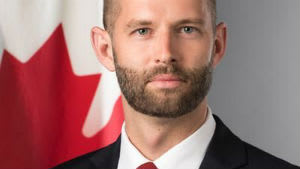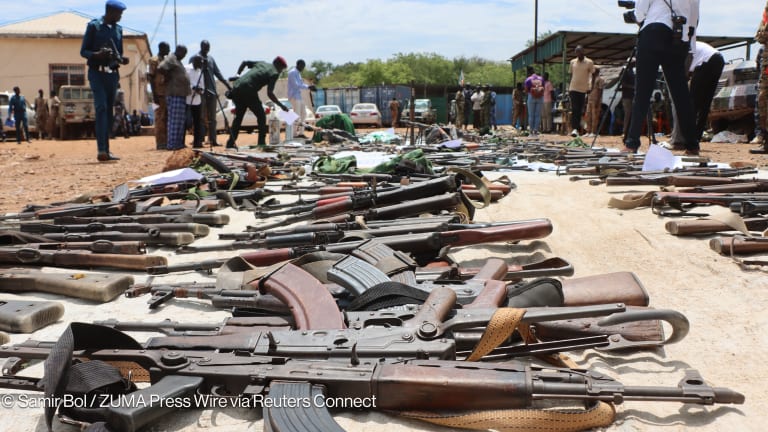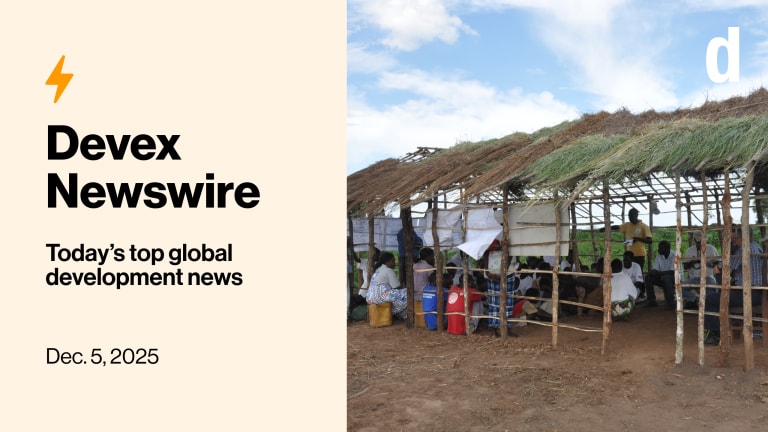
When fighting erupted in South Sudan’s capital of Juba in July 2016, the Canadian Embassy — along with many others — shut its doors and evacuated staff. Eight months later, on March 6, Canada’s Embassy officially reopened, and is once again operating at full capacity.
Canada is the fourth largest humanitarian donor in South Sudan, but you “won’t necessarily see a Canadian flag or flagship project on humanitarian assistance,” Ambassador of Canada to South Sudan Alan Hamson told Devex, adding that Canada prides itself on providing “unattached and untied” funding to trustworthy humanitarian agencies on the ground.
In his first media interview since the reopening, Hamson discusses the realities on the ground with regards to the famine, the conflict and the ongoing security risks faced by humanitarians.
Below is an excerpt from our conversation, edited for length and clarity.
What factored into the decision to reopen the Canadian Embassy now?
When you evacuate your staff from a zone of active hostilities, people expect a certain degree of due diligence before sending them back to work. Even though things had calmed after July’s events, there was a need for a real review of our precautions and mitigation measures to make sure we were taking the right steps. In the new year, the government had taken some measures in terms of checkpoints and weapon searches in Juba, which created a more favorable environment. There’s a lot of uncertainty and instability around the country, but by January it was clear, operationally, that it was ok.

What’s the biggest difference between now and then?
There was a high volume of petty crime incidents on the street in December in terms of attempted robberies and shakedowns. We were quite concerned about being a target of opportunistic crime. We are still watching the situation every day, and if we thought things were heating up in that respect we’d take measures to keep the team safe and protect our operations.
What security measures are you taking, given the recent surge in attacks on aid workers?
Each of Canada’s implementing partners is required to develop, and regularly update, operational security plans in light of the evolving threat environment. A serious operational security approach is among the criteria that Canada considers when contemplating potential programming opportunities. Our partners participate in a range of coordination and information sharing forums, including the Humanitarian Country Team and the South Sudan NGO Forum, and other mechanisms that share up-to-date security information.
Canada has recently pledged $36.9 million worth of aid to South Sudan. What is significant about this?
It was an important decision to take, as the world is facing the most serious humanitarian crisis in many years. We’ve unfortunately seen the fruit born of some of these situations, including the instability of conflict and the gradual degradation of food security in this country having reached the point of famine, which hasn't been declared in six years. So it’s quite a serious and sad milestone.
The volume of people in a dire humanitarian situation is mind blowing. Five and a half million within the next six months will be facing severe food insecurity, which is directly below famine. This will affect half the population. That’s a staggering number of people who really require a concerted effort from humanitarian agencies to maintain their basic food and nutrients.
How will the funds be distributed?
Our biggest recipient by far is the World Food Programme. We give them 40 percent of our humanitarian assistance because they are the backbone to fight against hunger in South Sudan. We also contribute a huge amount to International Committee of the Red Cross, which provides both food and emergency medical assistance and a variety of other activities. We give a huge amount to UNICEF and to the U.N. High Commissioner for Refugees, and the International Organization for Migration is our number three. They support the different displaced person’s camps, as well as trying to reach people not in the camps but in rural areas.
The money goes to other NGOs as well, such as Concern Worldwide, the Tearfund and Save the Children amongst others. We try to give money without conditions. Organizations know where the needs are, and they should be free to address and respond to them with flexibility.
Currently, what is the biggest challenge for your implementing partners?
There’s no question that other than the scale of the needs, humanitarian access has been a serious challenge. The international community has sought to engage all the actors in this issue, but it’s not easy. There’s a long history in South Sudan of humanitarian agencies struggling to deliver aid where it’s most needed in the context of conflict. It’s also not unique to South Sudan that in an armed conflict, humanitarian aid sometimes faces obstruction, diversion or bureaucratic impediments.
How do you combat these access challenges?
There are different levels of action. On the field level, humanitarian workers need to negotiate access every day, at every movement. It’s a complex battle space. At every corner of this country, there’s a variety of actors involved — including political and armed movements — in delivering humanitarian assistance. Agencies have a very difficult task to make sure everyone is on board and that there is no obstruction, as they stand by the principle that aid is not political. It needs to go to those most in need, and that should be the only factor in determining where it’s delivered.
“[Aid] needs to go to those most in need, and that should be the only factor in determining where it’s delivered.”
— Alan Hamson, ambassador of Canada to South SudanAdditionally, at our level as a donor, we try to resource the agencies as much as we can, in accordance with the need they’re addressing. At the national level, we support the U.N. system and the humanitarian country team. The high-level humanitarian oversight committee and a humanitarian access-working group, which is chaired by the U.N. system, work together with the donors and all the agencies who provide them with ground level information. It’s an extraordinarily complex task, but it couldn't be more urgent.
What is the Canadian response to South Sudan’s announcement that they’ll be raising work permit fees for aid workers to $10,000 per person?
Canada is deeply concerned by that decree. It would be a huge obstacle for humanitarian agencies and our NGO development partners. It would be unprecedented globally, and would run contrary to long-standing practice in this country that human assistance is exempt from taxation. There’s no question that this is a big problem.
Is South Sudan set to reverse its $10,000 aid worker permit fee?
Two weeks after its announcement, NGOs and government officials are pressuring South Sudan to reconsider its dramatic aid worker permit fee hike. Recent diplomatic meetings in the country could spell a reverse for the directive.
As a result, we are deeply engaged with all of our partners, as nothing in South Sudan happens in a vacuum. We’re also encouraging the government to reconsider the decision. That process is ongoing and we haven’t seen a final outcome. It has to change, as it’s an unreasonable amount of money to charge humanitarian agencies and development organizations, if in fact they can be charged anything at all.
What’s your biggest concern with regards to achieving the mission’s goals in South Sudan?
The key messages that we’re always raising to anyone who will listen, is that the urgent humanitarian needs in this country will only be truly met when there is a ceasefire, when the guns are silent. That’s when we can start working towards a durable peace. If there were no conflict in South Sudan, we would not be having this conversation about famine. We would be talking about long-term development. We would be setting the stage for South Sudan to once again be the breadbasket for this region, to be developing its infrastructure and to be working on sustainable resource extraction in terms of minerals and petroleum.
Instead, we’re trying to keep almost one-half of its population alive, and that’s not because of natural phenomenon or drought. Of course climate change is a factor, but it is overwhelming a man-made issue. We’re doing everything we can to facilitate the work of humanitarian agencies in South Sudan and we’re working urgently with all of our partners in civil societies and other actors in order to set the stage for a ceasefire and a durable peace. That’s definitely our top priority.
What can implementing partners and NGOs expect to see from the Canadians in the coming months?
We are exploring additional programming opportunities to address basic human development needs, particularly in the areas of health and food security in South Sudan. Any new initiatives will be closely aligned with the priorities of Canada’s Minister for International Development, including supporting the poorest and most vulnerable in fragile states, as well as the empowerment of women and girls, which includes a focus on sexual and reproductive health and rights.
Read more international development news online, and subscribe to The Development Newswire to receive the latest from the world’s leading donors and decision-makers — emailed to you free every business day.








